|
Charleston, SC real
estate
Update
|
"REAL Charleston News Fall 2007"
WHAT'S GOING ON IN
CHARLESTON...
Fall brings
cooler temperatures and a colorful variety of events throughout
the Charleston area, as it's time to get out and enjoy a
wonderful mix of cultural events, recreation and fun.
The charming
beauty of Charleston's historic landscapes an living spaces
shows forth in the Preservation Society of Charleston's 31st
annual Fall Tour of Homes and Gardens, Sept. 27th through Oct.
28th, Thursday, Friday and Saturday evenings only. Guided tours
in candle light settings feature dozens of the city's most
venerated sites and offer a wonderful experience in some of the
most exquisite interiors and exteriors anywhere. For tickets and
information, call 843-722-4636.
FEATURED CHARLESTON PROPERTIES
To view more Charleston area
listings, please visit
Charleston Real Estate
Halloween fun
begins with the St. Paul Country Day School's always-popular
Halloween Extravaganza, weekends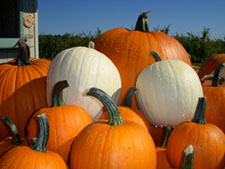 throughout the month of October
on S.C. Highway 165 in Hollywood. Food and family fun are a
major draw in an event whose centerpiece is an incredible
hayride journey through a series of ghostly haunts and hideaways
guaranteed to raise the hair on the head. For information call
843-889-1330. throughout the month of October
on S.C. Highway 165 in Hollywood. Food and family fun are a
major draw in an event whose centerpiece is an incredible
hayride journey through a series of ghostly haunts and hideaways
guaranteed to raise the hair on the head. For information call
843-889-1330.
For the younger
set, a Fall favorite is the Charleston Corn Maize at Legare
Farms on Johns Island, Fridays, Saturdays and Sundays throughout
October. Hayrides, pumpkin-gathering and scarecrow-building are
great ways to spend the day with the little ones in this
friendly sea island farm setting. For information call
843-559-0788.
Another local
favorite especially enjoyable in the crisp fall weather is the
French Quarter Art Walk, Dec. 7th, downtown in the
historic area bordered by Broad, Meeting, Queen and East Bay
Streets. More than two dozen art galleries open their doors for
those who love to peruse art as well as those who simply enjoy
the artful atmosphere. For more information on this free event,
call 843-577-7100.
|
CHARLESTON OUTDOORS
A drive through
the scenic back roads of the ACE Basin is not only like a step
back in time, but it also provides a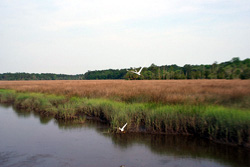 glimpse of the future,
because the 350,000 acres of protected wetlands and forest will
still be as pristine and unspoiled in future generations. The
ACE is an acronym for Ashepoo, Combahee, and Edisto, the three
rivers whose waters give life and shape to the area. Meandering
through a diverse landscape of cypress swamp, rice fields, old
growth forest, salt marsh, and coastal estuary, the ACE's
river-system has been cherished since ancient times as a
thriving hunting ground, wildlife habitat, timber source and
scenic homeland. It was the desire to glimpse of the future,
because the 350,000 acres of protected wetlands and forest will
still be as pristine and unspoiled in future generations. The
ACE is an acronym for Ashepoo, Combahee, and Edisto, the three
rivers whose waters give life and shape to the area. Meandering
through a diverse landscape of cypress swamp, rice fields, old
growth forest, salt marsh, and coastal estuary, the ACE's
river-system has been cherished since ancient times as a
thriving hunting ground, wildlife habitat, timber source and
scenic homeland. It was the desire to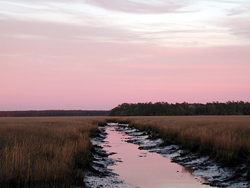 protect its natural beauty
and resources by establishing a conservation plan that assures
the ACE will only be used for traditional cultivation and
cultural purposes, and that the area will be a haven for many
threatened and endangered species, including the great bald
eagle, the American wood stork, the short-nosed sturgeon and the
loggerhead sea turtle. One of the best places to enjoy the ACE
is at the Bear Island Wildlife Management Area on Bennet's Point
Road in Colleton County. Open to public viewing from February
through mid-October, the area features lush wetlands and
impoundments that attract an stunning annual migration that
includes trumpeter swans, Canada geese, and a vast assortment of
waterfowl. protect its natural beauty
and resources by establishing a conservation plan that assures
the ACE will only be used for traditional cultivation and
cultural purposes, and that the area will be a haven for many
threatened and endangered species, including the great bald
eagle, the American wood stork, the short-nosed sturgeon and the
loggerhead sea turtle. One of the best places to enjoy the ACE
is at the Bear Island Wildlife Management Area on Bennet's Point
Road in Colleton County. Open to public viewing from February
through mid-October, the area features lush wetlands and
impoundments that attract an stunning annual migration that
includes trumpeter swans, Canada geese, and a vast assortment of
waterfowl.
|
 |
CHARLESTON EXPLORER
As
falling temperatures encourage a return to the the simple
pleasures of strolling
downtown Charleston,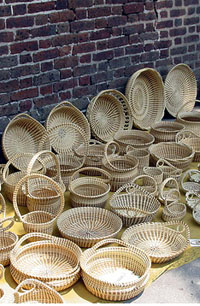 one enjoyable highlight is a
visit with one of the many sidewalk weavers. Along both
sides of Meeting Street just south of Broad, and at
various locations around the city market, the ancient
tradition of sweetgrass basket-making is played out by
hand each day. Most weavers are older ladies, who learned
their trade, as all in the sweetgrass community do, from
previous generations. As they sit, surrounded by
beautifully-woven baskets of every imaginable shape, they
focus on the work that requires pain-staking hours and
complete concentration. Pardon them if they aren't
especially vocal, or are a little annoyed by those who
only want to take pictures, for this is their workplace,
this is their income, and although they want folks to
enjoy the scene, they hope those who hover will make a
purchase. After all, they had to go into snake-infested
wetlands to gather strands of sweetgrass, bull rush,
palmetto fronds and long-leaf pine, and use these simple
ingredients to weave, stitch by stitch, baskets that may
take weeks to finish. Using only a spoon handle, known as
a "nail bone", they will work the varying strands into
intricate patterns that show off color and design, while
adding lasting strength. A finished basket will last a
lifetime and is a direct tie to one of Charleston's oldest
and most venerated cultural traditions. So enjoy a stop
among those who keep the sweetgrass tradition alive, but
remember to reward their efforts or continue on. one enjoyable highlight is a
visit with one of the many sidewalk weavers. Along both
sides of Meeting Street just south of Broad, and at
various locations around the city market, the ancient
tradition of sweetgrass basket-making is played out by
hand each day. Most weavers are older ladies, who learned
their trade, as all in the sweetgrass community do, from
previous generations. As they sit, surrounded by
beautifully-woven baskets of every imaginable shape, they
focus on the work that requires pain-staking hours and
complete concentration. Pardon them if they aren't
especially vocal, or are a little annoyed by those who
only want to take pictures, for this is their workplace,
this is their income, and although they want folks to
enjoy the scene, they hope those who hover will make a
purchase. After all, they had to go into snake-infested
wetlands to gather strands of sweetgrass, bull rush,
palmetto fronds and long-leaf pine, and use these simple
ingredients to weave, stitch by stitch, baskets that may
take weeks to finish. Using only a spoon handle, known as
a "nail bone", they will work the varying strands into
intricate patterns that show off color and design, while
adding lasting strength. A finished basket will last a
lifetime and is a direct tie to one of Charleston's oldest
and most venerated cultural traditions. So enjoy a stop
among those who keep the sweetgrass tradition alive, but
remember to reward their efforts or continue on. |
CHARLESTON TRIVIA
The original
peninsular city of Charles Town was surrounded by a wall built
around 1704, and was one of only four walled cities in North
America. Made of combinations of stone, brick, wood and earth,
the walls were meant to protect the city from invasions of
pirates, French and Spanish from the sea, as well as Indian
tribes from inland. After the city came under the protect of the
British crown in 1720, the walls began to be dismantled, but
many of the foundations remain. In the dungeon of the Old
Exchange at the foot of Broad Street, sections of the wall can
still be seen, and remnants extend all the way down East Bay
Street beneath the sidewalk. Sections are also still intact
beneath the pavement along Water Street, and the city plans an
archeological dig and survey of one of the major redans, which
was a defensive design that protruded outward, still existing at
the corner of East Bay and South Adger's Wharf.
CHARLESTON ARCHITECTURE - Featured home: Miles Brewton House
The Miles
Brewton House at 27 King Street is considered one of the finest
examples of Georgian Palladian houses in America, and was
headquarters for Lord Cornwallis and other English military
leaders when Charleston was captured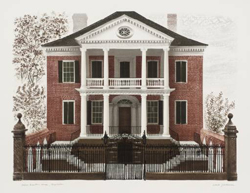 during the Revolution, as
well as headquarters for Union generals after Charleston was
evacuated in the Civil War. Built by Brewton between 1765 and
1769, the house features a two-tiered portico of Tuscan and
Ionic columns of Portland stone, with a platform of paved marble
reached by marble steps. Inside, both marble and mahogany
carvings grace a grand stairway and drawing room, accented by
the original crystal chandelier. Yet for all its charming
beauty, the most striking and memorable feature of the house is
purely there as a means of causing pain and suffering. Atop the
wrought iron gates entering the property stretches one of the
city's most noted examples of Cheveaux-de-Fries, a spiked iron
barrier bristling with sharp, menacing points. Literally
translated as "horses of Friesland", the term comes from an 18th
century battle in today's Netherlands in which spiked defenses
were used against cavalry. The concept was adapted in Charleston
after a foiled 1822 slave uprising as a means of protecting
homes from possible intruders climbing over gates. Find out more about Charleston's most famous addresses... during the Revolution, as
well as headquarters for Union generals after Charleston was
evacuated in the Civil War. Built by Brewton between 1765 and
1769, the house features a two-tiered portico of Tuscan and
Ionic columns of Portland stone, with a platform of paved marble
reached by marble steps. Inside, both marble and mahogany
carvings grace a grand stairway and drawing room, accented by
the original crystal chandelier. Yet for all its charming
beauty, the most striking and memorable feature of the house is
purely there as a means of causing pain and suffering. Atop the
wrought iron gates entering the property stretches one of the
city's most noted examples of Cheveaux-de-Fries, a spiked iron
barrier bristling with sharp, menacing points. Literally
translated as "horses of Friesland", the term comes from an 18th
century battle in today's Netherlands in which spiked defenses
were used against cavalry. The concept was adapted in Charleston
after a foiled 1822 slave uprising as a means of protecting
homes from possible intruders climbing over gates. Find out more about Charleston's most famous addresses...
|
|
Median Price
Levels as Market Continues to Stabilize
Charleston, S.C. (September 10, 2007) –– Berkeley county
experienced an increase in median price of 14.8 percent over
August 2006 while the median price of a home purchased in the
lowcountry overall decreased by half a percent over August 2006.
Sales slowed by 15.2 percent to1065 total units over August
2006, according to the Charleston Trident Association of
REALTORS®.
The median price year-to-date rose by 1.7 percent (from $207,474
to $211,000). Year-to-date sales for 2007 (9061 through August)
are down by 19.1 percent over the same period in 2006 (11200).
“All real estate is local,” said David Kent, President of the
Charleston Trident Association of REALTORS®. “This is very
apparent in Berkeley county where the median price has increased
14 percent over this time last year. Combined with steady sales
in other areas, this is further evidence our market as a whole
is still very healthy.”
|
Sold - August
and September |
Total |
Avg List $ |
Avg Sold $ |
Avg DOM |
%SP/LP |
|
Downtown
Charleston - South of Crosstown -
Condos |
36 |
$507,529 |
$494,493 |
108 |
97.43% |
|
Downtown
Charleston - South of Crosstown - Single Family |
25 |
$1,288,112 |
$1,204,091 |
139 |
93.48% |
|
Mount Pleasant North of Hwy 41
- Single Family |
56 |
$456,212 |
$437,467 |
128 |
95.89% |
|
Mount Pleasant South of Hwy 41
- Single Family |
120 |
$538,394 |
$517,200 |
109 |
96.06% |
|
James Island -
Single Family |
72 |
$354,061 |
$341,547 |
107 |
96.47% |
|
Kiawah Island/ Seabrook Island
- Condos - both islands |
12 |
$632,742 |
$579,542 |
143 |
91.59% |
|
Kiawah Island/
Seabrook Island - Single Family - both islands |
8 |
$1,170,863 |
$1,066,438 |
142 |
91.08% |
|
Isle of
Palms - Single Family |
12 |
$2,272,583 |
$2,088,750 |
201 |
91.91% |
|
Daniel Island -
Single Family |
32 |
$845,155 |
$814,258 |
38 |
96.34% |
|
Sullivan's Island
- Single Family |
8 |
$2,501,750 |
$2,272,813 |
155 |
90.85% |
|
West Ashley -
Single Family |
37 |
$297,197 |
$282,584 |
95 |
95.08% |
I
would like to hear from you! If
you have questions about a topic in this newsletter, Charleston
SC or property in the tri-country area, please
email
or call me.
Charleston Real Estate
843-568-0595
www.CharlestonAddress.com
www.Locountry.com
Charleston Real Estate News Archives
Downtown Charleston, West Ashley, Johns Island, James Island, Kiawah Island, Seabrook Island, Sullivan's Island, Isle of Palms
(Wild Dunes), Edisto Island,
Folly Beach, Mount Pleasant,
Wadmalaw Island and Daniel Island
return to Charleston Real Estate home
page
Charleston, SC Newsletters: Summer 2006,
Spring 2007,
May 2007,
Summer 2007,
Early Fall,
Fall 2007 |
|